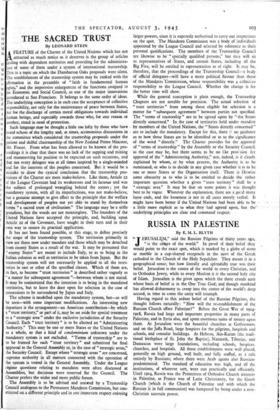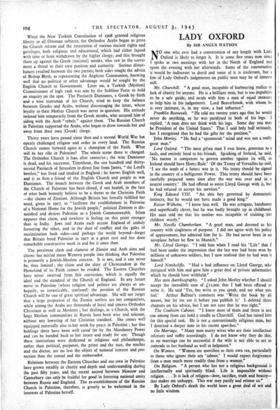RUSSIA IN PALESTINE
By E. M. L. BLYTH
"ijERUSALF,M," said the Russian Pilgrims of thirty years ago, " is the centre of the world." In proof of their belief they would point to the exact spot, which is marked by a globe of stone or marble in a cup-shaped receptacle in the nave of the Greek cathedral in the Church of the Holy Sepulchre. They meant it in a geographical sense; but how literally and splendidly true was their belief. Jerusalem is the centre of the world to every Christian, and to Orthodox Jewry, while to every Moslem it is the second holy city of Islam. Jerusalem is the pivot upon which the three creeds turn whose basis of belief is in the One True God; and though mankind has allowed disharmony to creep into the centre of the world's deep accord, in time to come the unity will triumph.
Having regard to this ardent belief of the Russian Pilgrims, the thought follows naturally: " How will the re-establishment of the Russian Church affect Palestine?" Before the Great War of 1914- 1918, Russia had large and important properties in many parts of Palestine, and in Syria also, and spent enormous sums of money upon them. At Jerusalem were the beautiful churches at Gethsemane and on the Jaffa Road, large hospices for the pilgrims, hospitals and schools, and consular buildings. At Hebron, Ain-Karim (the tradi- tional birthplace of St. John the Baptist), Nazareth, Tiberias, and Damascus were large foundations, including schools, hospices. churches, and hospitals. All these establishments were well placed, generally on high ground, well built, and fully staffed, as a rule entirely by Russians; where there were Arab agents also Russians predominated. The standard of education was high, and all the institutions, of whatever sort, were run practically and efficiently. Until 1914, Russia was the Protectress of Orthodox Church interests in Palestine, as France was of Latin Christianity, for the Greek Church (which is the Church of Palestine and with which the Russian is in full communion) was hampered by being under a non- Christian suzerain power.
When the New Turkish Constitution of 1908 granted religious liberty to all Ottoman subjects, the Orthodox Arabs began to press for Church reform and the restoration of various ancient rights and privileges, both religious and educational, which had either lapsed with time or been withdrawn by the higher clergy; and this brought them up against the Greek (national) monks, who saw in the move- ment a threat to their own position and authority. Serious distur- bances resulted between the two parties; both sides sought the advice of Bishop Blyth, as representing the Anglican Communion, knowing well that no political or other advantage would be sought by the English Church or Government. Later on, a Turkish (Moslem) Commissioner of high rank was sent by the Sublime Porte to hold an enquiry on the spot. The Patriarch Damianos, a Greek by birth and a wise statesman of his Church, tried to keep the balance between Greeks and Arabs, without discouraging the latter, whose loyalty to their Mother Church was never in question. His attitude isolated him temporarily from the Greek monks, who accused him of siding with the Arab " rebels" against them. The Russian Church in Palestine supported the Arabs, who began to draw towards her and away from their own (Greek) clergy.
Thirty years have passed since then and a second World War has openly challenged religion and order in every land. The Russian Church comes forward again as a champion of the Faith. What will be her role in Palestine? The whole scene there is changed. The Orthodox Church is free, after centuries ; the wise Damianos is dead, and his successor, Timotheus, the one hundred and thirty- second Patriarch of Jerusalem in direct line from James, " the Lord's brother," has lived and studied in England ; he knows English well, and is as firm a friend of the English Church and people as was Damianos. The breach between the Greek and Arab members of the Church of Palestine has been closed, if not healed, in the face of what both honestly believe to be a threat to the Christian Faith —the claims of Zionism. Although Britain has literally fulfilled her word, given in 1917. to " facilitate the establishment in Palestine of a National Home for the Jewish people," political Zionism is dis- satisfied and desires Palestine as a Jewish Commonwealth. Islam opposes that claim, and nowhere is feeling on this point stronger than in India. Jews and Arabs each accuse England of unduly favouring the other, and in the dust of conflict and the gales of recrimination both sides—and perhaps the world beyond—forget that Britain freed Palestine in 1917 at a great cost and has done remarkable constructive work in and for it since then.
The persistent clash and clamour of Zionist and Arab aims and claims has misled many Western people into thinking that Palestine is primarily a Jewish-Moslem concern. It is not, and it can never be, thus limited ; the claim and the duty of Christendom in the Homeland of its Faith cannot be evaded. The Eastern Churches have never swerved from this conviction, which is equally the ideal and the standard of the Church of England. In any future move in Palestine (where religion and politics are always so un- happily, so inextricably, confused) the position of the Russian Church will be one of great spiritual advantage. She will not forget that a large proporton of the Zionist settlers are her compatriots, while among the Arabs are thousands of loyal and sincere Orthodox Christians as well as Moslems ; her dealings, as a Church, with the large Moslem communities in Russia have been wise and tolerant, without any lowering of her Christian standard. She comes well equipped materially also to her work for peace in Palestine ; her fine holdings there have been well cared for by the Mandatory Power and can be handed back to her intact and ready for use. Though these institutions were dedicated to religious and philanthropic, rather than political, purposes, the priest and the nun, the teacher and the doctor, are no less the object of national interest and pro- tection than the consul and the ambassador.
Relations between the Eastern Churches and our own in Palestine have grown steadily in charity and depth and understanding during the past fifty years, and the recent accord between Moscow and Canterbury can only be fruitful for good in fostering national amity between Russia and England. The re-establishment of the Russian Church in Palestine, therefore, is greatly to be welcomed in the interests of Palestine herself.























 Previous page
Previous page